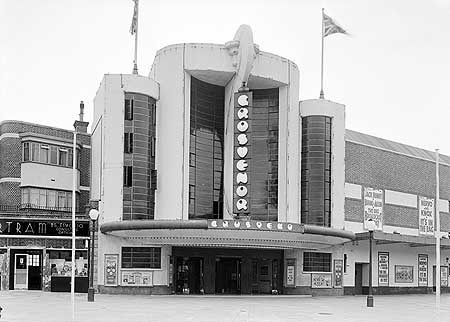Gwen Curnick (GC-95-191) and Fred Curnick (FC-95-192)

The Grosvenor, Harrow (uploaded by Granola).Creative Commons (Attribution) License via cinematreasures.org
In the early summer of 1995 Gwen Curnick heard about Cinema Culture in 1930s Britain through her local history society, and contacted the project office with an offer of assistance. With her brother, Fred, she soon joined CCINTB's eighteen core informants based in and around the London suburb of Harrow. Gwen and Fred Curnick were both born in South Harrow, in 1924 and 1920 respectively, into a family of three children, plus two considerably older half-sisters from their father's first marriage. Mr Curnick Senior was a tallow merchant; and, aside from some paid employment during the war, his wife was a full-time housewife. Both siblings left school at fourteen, with Fred at first following his father into the tallow trade, and then later running a greengrocer's shop and a tobacconist. Gwen took an office job on leaving school, and spent most of her subsequent working life in the Civil Service and in local government. Aside from Fred's war service in India, both had lived in South Harrow all their lives, Gwen in the house that she and Fred grew up in. It was there that the pair were interviewed together on 5 July and 19 July 1995.
Their first interview opens with a discussion of some of the cinemas operating in Harrow during the 1930s, and with recollections of their parents' cinemagoing habit. They talk about the free bus service that ferried filmgoers up Harrow Hill to the Cosy Cinema and down again; about motor excursions and holidays with parents; and about cinemagoing and courtship. They reflect on the popularity of ballroom dancing in the 30s, recalling a dancehall and a school of dancing in South Harrow owned by a friend. Reflections on why people preferred American films to British-made ones lead into shared memories of listening to songs from film musicals on gramophone records and on the radio. They ruminate on the huge changes Harrow has undergone during their lifetimes: when they were young, they recall, the countryside was just a short walk from the house. The interview concludes with amusing tales of mixed fortunes during holiday trips to Scotland. The second interview opens with the naming of celebrities living in Harrow, before turning to consideration of the special qualities of various film personalities and the changes over the years in their own star and film preferences. In the course of the interview, prompted by each other and by leafing through 1930s film annuals brought along by the interviewer, the siblings call to mind a hundred or more film stars. On the British film stars who were not snapped up by Hollywood, their agreed verdict is that "We only had the dregs over here". Going to the pictures, they emphasise, was the main leisure opportunity in their youth, being far more affordable than it is today. They recollect the lively family life they shared as youngsters--their parents were strict, but were happy to welcome their children's friends and other visitors into the home. They discuss the "rare treat" of going to London's West End to see a play or a film, and about film screenings at school; and Fred recalls putting on home film shows with a projector and reels of early films and newsreels that he was given at the age of about ten.Interview transcript | Listing of cinemas, films and stars mentioned
Audio-synced interview (2 of 2)
Interview transcript | Listing of cinemas, films and stars mentioned
Documents, Memorabilia and Related Links
Harrow home pageCosy Cinema, Harrow (cinematreasures.org)
Harrow Cottage Hospital (harrowonline.org)
Extract from Cape to Cairo, 1926 (Youtube)
Fred Astaire singing 'Top Hat, White Tie and Tails', 1932 (Youtube)
The Elite, the Cosy and the Cosy bus (News & Blog area)